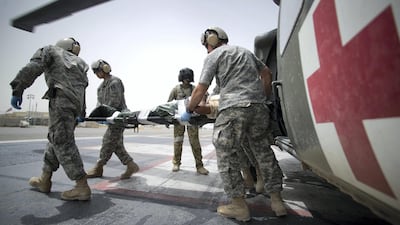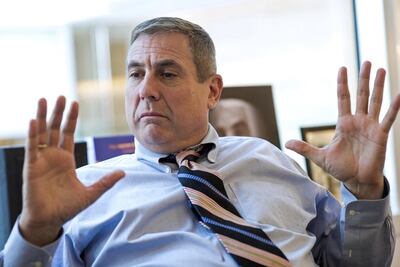A military hospital in Abu Dhabi to be built in partnership between the UAE and US has been called a “natural extension” of security ties between the nations.
Danny Sebright, president of the US-UAE Business Council, revealed that talks over the new facility, announced last week, began under former president Barack Obama.
The hospital would benefit both sides by providing a centre in the region to treat servicemen and women injured on the battlefield, Mr Sebright said.
He compared the new hospital, which will specialise in trauma, burns and rehabilitation, to the sprawling Fifth Fleet naval base in Bahrain, which is home to about 7,000 US service personnel.
A detailed agreement between the two sides is now being worked on. Equipment and expertise will be provided by the US in exchange for the right to send wounded troops to the UAE-funded hospital.
Mr Sebright said Washington was looking for ways around an agreement that stopped it selling armed drones to nations in the Gulf, which have turned to the Chinese for the technology.
He said a deepening relationship between Gulf countries and China with arms sales worried senior figures in Washington.
“This comes from a mutual interest of both the US and UAE militaries to have this recovery capability here in the region,” said Mr Sebright, a former policy director at the US Defence Department.
“The hospital facilities in the UAE are world class, but for people on a battlefield who get shot up or are injured in explosions and have severe burns, you need highly specialised care that even the best civilian hospitals do not necessarily provide.
“This is a natural extension of our close co-operation with the Emiratis here in the UAE.”
Mr Sebright said that while US President Donald Trump said he would pull many of the country's troops out of Syria, the US would keep troops and ships in the region.
Sending US servicemen and women based in the Middle East to a hospital in Abu Dhabi is preferable to putting them on a seven-hour flight to Germany's Landstuhl military hospital.
“It’s just a logical next step," Mr Sebright said after the International Defence Exhibition and Conference in Abu Dhabi, last week.
Before the five-day event, the US-UAE Business Council, which builds business and commercial ties between the countries, published a report in which it noted the UAE's "potential willingness to turn to non-western countries for major military systems, such as combat aircraft".
In particular, Gulf countries have turned to China for armed drone technology, with the US versions unavailable in the region.
Lt Gen Charles Hooper, director of America’s Defence Security Co-operation Agency who announced the new hospital, said last week that the US was also reviewing its policies for drone sales.
Mr Sebright said the Missile Technology Control Regime agreement, signed by the US in 1987, restricted America's ability to sell drones but was being updated.
He said America was keen to sell the technology to its allies, although they might have to sign agreements detailing the circumstances in which the weapons can be used.
“The UAE has a natural trade relationship with China and Asia that is thousands of years old," Mr Sebright said.
"So it only makes sense that there is a business relationship there as well. It is a closer defence and security relationship between China and the Gulf countries that worries the US.
“What we’re trying to do is bring the agreement into the 2020s, looking for workarounds to sell drones to our partners who need it or want it, but also putting provisos in place, such as using agreements that say you only use it in certain circumstances.
“We still have the best and most sophisticated technology in this area. And if you go with the Chinese, our military is just not going to do a joint operation with a Chinese drone. That’s just not the way it works.”


